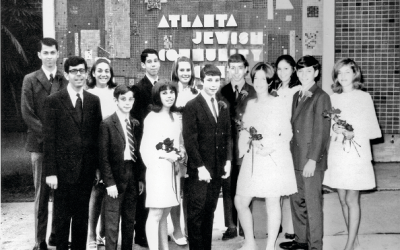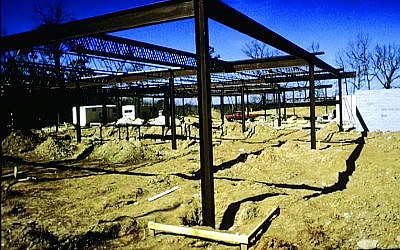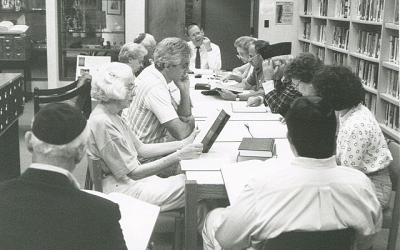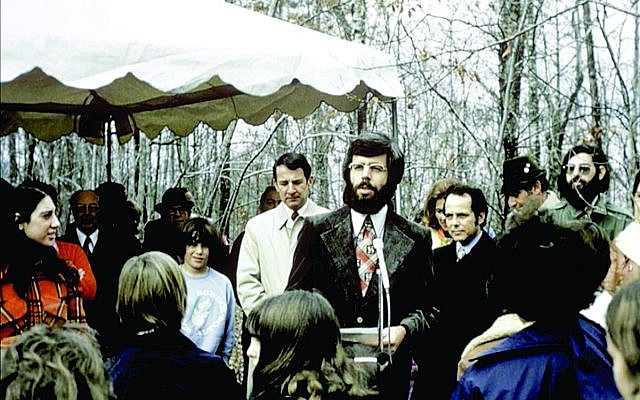Temple Sinai Reaches the Big 5-0
Pioneered by families who wanted b’nai mitzvah, founders of Temple Sinai reflect on the early days.
Legend has it that a couple of dads were sitting on a back porch, watching their kids play in the yard. They wondered aloud if their young sons would one day grow up, stand on the bimah and become b’nai mitzvah. The longer they talked, the faster they realized that Atlanta needed a different kind of Reform synagogue. The year was 1968.
At the time, The Temple was the only Reform synagogue in the area. As a classical Reform congregation in the late 1960s, The Temple was not performing b’nai mitzvah.
Alfred Messer, an Emory psychiatrist, and James Smulian, a businessman, gathered 30 people to discuss the formation of The New Northside Congregation. The families of Milton Deitch, Joel Goldberg, Arthur Heyman, Gary Metzel and Ron Rosen were all involved in the earliest days.
In 1968, the United States was in a tumultuous state. Robert F. Kennedy and Martin Luther King Jr. were assassinated that year. The Vietnam War was in full swing. Race riots filled the streets of New York, Washington, D.C., and Detroit.
Jews in Atlanta reflected that restlessness. A community meeting held by the founding families, some members of The Temple and Ahavath Achim Synagogue, attracted more than 120 people. The word spread about a new Reform congregation forming with Rabbi Richard Lehrman – coming off his two-year contract as The Temple’s assistant rabbi – and people were captivated.
Rabbi Jacob Rothschild from The Temple gave his blessing.

Within a month, 145 families joined the congregation, renamed Temple Sinai. Lehrman led Shabbat services at Birney Elementary School on Northside Parkway, and attracted Jews from Buford Highway to Southwest Atlanta.
By fall 1968, Temple Sinai’s religious school classes began with more than 400 children.
Each synagogue member interviewed by AJT recalled that Lehrman was a charismatic leader. “Lehrman was bright, well-learned, and a good teacher. He was a great presence,” said Arthur Heyman, charter member and past president.
Jan Epstein and her husband, Warren, were charter members and Jan was its first female president in addition to co-founding The Davis Academy. She said the founding principles of Lehrman were simple: Get to know all members; perform b’nai mitzvot; and no plaques or dedications permitted so each member felt equal in the community.
“He captured us. We became instantly involved. Then we had to make a decision about belonging to two synagogues.”
Just 10 years after the founding of Temple Sinai, Rabbi Lehrman died at age 41. It was a tragedy that struck the entire community, and the only time in 50 years Temple Sinai conducted a rabbi search.
His obituary in the Nov. 16, 1979 issue of The Southern Israelite reads: “Rabbi Lehrman came to Atlanta at a time when he saw that the classical Reform movement was not fulfilling the needs of its younger members. In the creation of Temple Sinai, he attempted to provide a place of refuge from the systems and pressures of the modern world.”

Congregants say it was a gray, drizzly day when they hiked up a muddy hill at Dupree Drive to see the unveiling of a new life. Carrying umbrellas and pushing strollers, new members faced the cool winter weather to birth Temple Sinai.
It has been 50 years since the small havurah was established by the Union of Reform Judaism. Fifty years of building community, raising money, accepting members and establishing an Atlanta institution.
Bonnie Aronin recalled teaching religious school classes in an open concept floor plan. Seventh-, eighth- and ninth-grade students came during the week for education, and a 10th-grade confirmation class was formed.
“I’ve watched the community come full circle. So many kids who grew up at Temple Sinai came back to Atlanta to join as adults,” said Aronin, whose grandson had a bar mitzvah at Temple Sinai in 2016. “One of my former students is now my eye doctor.”
Son of founders Milton and Sara Deitch, Joel Deitch reflected on growing up at Temple Sinai.
“The founding members put in a lot of hours and meetings to make this thing successful. Its success came from it being a labor of love,” said Deitch, recalling a feeling of pride that his mother and father were building a community from the ground up. “I belong here. It fits, it’s comfortable, it’s light.”
After he got married, Deitch “did the tour de synagogue. Sinai still felt like home. It has the right balance of spirituality and intellectualism.”

Deitch and his brothers are still active at Temple Sinai. David led the environmental committee, while Daniel taught Sunday school for 20 years and Jonathan helped with sound engineering. Joel taught Sunday school and serves on the archive committee.
“It really is a living congregation that reinvented itself over and over again. The foundation of the egalitarian congregation in 1968 has evolved over time. It is in our DNA that these were important values,” Deitch said. “With openness, teamwork and durability Sinai is adapting as the world around us changes.”




comments